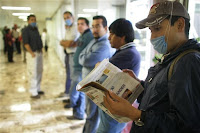
6 May 2009 -- As of 06:00 GMT, 6 May 2009, 22 countries have officially reported 1516 cases of influenza A (H1N1) infection.
Mexico has reported 822 laboratory confirmed human cases of infection, including 29 deaths. The United States has reported 403 laboratory confirmed human cases, including one death.
The following countries have reported laboratory confirmed cases with no deaths - Austria (1), Canada (165), China, Hong Kong Special Administrative Region (1), Colombia (1), Costa Rica (1), Denmark (1), El Salvador (2), France (4), Germany (9), Guatemala (1), Ireland (1), Israel (4), Italy (5), Netherlands (1), New Zealand (6), Portugal (1), Republic of Korea (2), Spain (57), Switzerland (1) and the United Kingdom (27).
It is considered prudent for people who are ill to delay international travel and for people developing symptoms following international travel to seek medical attention, in line with guidance from national authorities. Individuals are advised to wash hands thoroughly with soap and water on a regular basis and should seek medical attention if they develop any symptoms of influenza-like illness.
WHO advises no restriction of regular travel or closure of borders.
There is no risk of infection from this virus from consumption of well-cooked pork and pork products.
Further information on the situation will be available on the WHO website on a regular basis.
Frequently Asking Questions
What can I do?
Q : What are the recommendations for face masks?
If you are not sick you do not have to wear a mask. If you are caring for a sick person you should wear a mask. All home made masks should be cleansed regularly.
If you are sick, stay at home and avoid contact with people.
How can I protect myself and prevent illness?
Practise general preventive measures for influenza to prevent infection:
* avoid close contact with people who appear unwell and have fever and cough;
* wash your hands with soap and water thoroughly and often;
* practise good health habits including adequate sleep, eating nutritious food, and keeping physically active.
Q : How do I care for an ill person at home?
* Separate the ill person from others, keeping the person at least 1 metre in distance from others.
* Cover your mouth and nose when caring for the ill person. Either commercial or homemade materials are fine, as long as they are disposed of or cleaned properly after use.
* Wash your hands with soap and water thoroughly after each contact with the ill person.
* Improve the air flow where the ill person stays. Use doors and windows to take advantage of breezes.
* Keep the environment clean with readily available household cleaning agents.
If you are living in a country where there are infections follow additional advice from your national and local health authorities.
What should I do if I think I have the illness?
If you feel unwell, have high fever, cough or sore throat:
* Stay at home and keep away from work, school or crowds.
* Rest and take plenty of fluids.
* Cover your mouth and nose with disposable tissues when coughing and sneezing, and dispose of the used tissues properly.
* Wash your hands with soap and water often and thoroughly, especially after coughing or sneezing.
* Inform family and friends about your illness and try to avoid contact with other people.
Q : What should I do if I need medical attention?
* Contact your doctor or healthcare provider before travelling to a health facility, and report your symptoms. Explain why you think you have influenza A(H1N1) (if you have recently travelled to a country where there is an outbreak in humans). Follow the advice given to you.
* If it is not possible to contact your healthcare provider in advance, communicate your suspicion of infection as soon as you arrive at the facility.
* Cover your nose and mouth during travel.
Travel
Q : Is it safe to travel?
WHO is not recommending travel restrictions related to the outbreak of the influenza A(H1N1) virus. Today, international travel moves rapidly, with large numbers of individuals visiting various parts the world. Limiting travel and imposing travel restrictions would have very little effect on stopping the virus from spreading, but would be highly disruptive to the global community.
Influenza A(H1N1) has already been confirmed in many parts of the world. The focus now is on minimizing the impact of the virus through the rapid identification of cases and providing patients with appropriate medical care, rather than on stopping its spread internationally. Furthermore, although identifying the signs and symptoms of influenza in travellers can be an effective monitoring technique, it is not effective in reducing the spread of influenza as the virus can be transmitted from person to person before the onset of symptoms. Scientific research based on mathematical modelling indicates that restricting travel will be of limited or no benefit in stopping the spread of disease.
Historical records of previous influenza pandemics, as well as experience with SARS, have validated this point.
Travellers can protect themselves and others by following simple recommendations related to travel aimed at preventing the spread of infection. Individuals who are ill should delay travel plans and returning travellers who fall ill should seek appropriate medical care. These recommendations are prudent measures which can limit the spread of many communicable diseases and not only Influenza A(H1N1).
— World Health Organization (WHO)
No comments:
Post a Comment